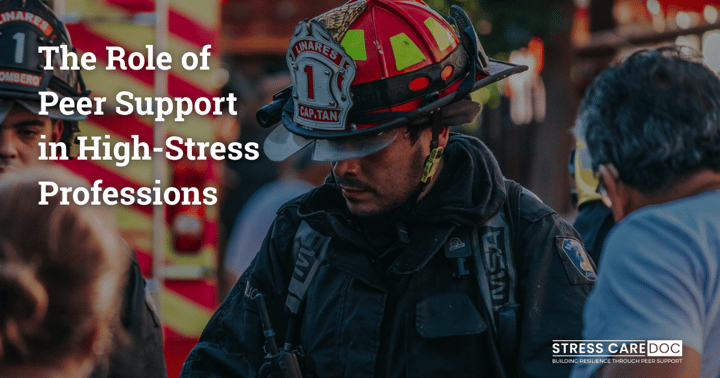Find Hope If You're Thinking of Suicide

Dealing with emotional pain and suicidal thoughts is incredibly challenging, especially for first responders who face daily stress and trauma. If you're thinking of suicide, I want to offer you hope and practical steps if you are feeling overwhelmed by your job and life.
Understanding the Reality of Emotional Pain
Emotional pain is real, and it's not something that can be easily dismissed. It's tough to walk each day without hope, feeling like you can't go on. Recently, the tragic loss of Nicole Ford, a retired Boston police dispatcher, reminded me of the severe impact of depression. Nicole's story, featured in the film PTSD 911, is a stark reminder that even those who dedicate their lives to helping others can struggle deeply.
I've experienced this pain firsthand, believing at times that all my troubles would end if I were no longer here. Many others have felt the same way. It's important to talk openly about these feelings, no matter how hard it might be.
The Weight of the Job
For first responders and those who regularly deal with others' crises, the weight of the world can feel like it's on your shoulders. Daily stress, trauma, and pressures can pile up, making it seem like there's no way out. Even if that little voice in your head says it's no use, talking about it openly and honestly can be the first step toward finding hope and help.
If you're feeling an overwhelming urge to let go or like you can't go on, know that you're not alone. There are people who care deeply about your well-being, and there's always hope.
Taking the First Step
One of the most important things to understand about suicide is that it's not a sign of weakness or that you're crazy. It's a response to intense emotional or physical pain, but it's not the only solution. Suicide is a permanent solution to a temporary problem.
The pain you're feeling isn't just a bad day; it's a constant weight. The stress from work combines with everyday life pressures like bills, family responsibilities, and personal expectations, making you feel crushed from all sides. Whether it's a recent loss, a breakup, or feeling like a failure, remember that things are never as good or as bad as they seem.
Recognizing the Need for Help
Feeling overwhelmed, hopeless, and isolated is normal in high-stress jobs. You might think you should handle everything, but no one is immune to the toll these jobs can take. It's easy to fall into the trap of thinking no one understands what you're going through or that you're burdening others by sharing your struggles.
Reaching out for help is not a sign of weakness. It's the first step towards finding relief and hope. You're not alone, and there are people and resources ready to support you through this difficult time.
If you are in crisis, stop right now and dial 988 in the US to talk to someone who will listen and help you get the support you need. Or text HELLO to 741741.
Practical Steps to Manage Stress
Here are some practical steps you can take to start feeling better:
-
Get Active: Physical activity helps release tension and improve your mood. Even a short walk or a quick workout can make a difference.
-
Engage in Hobbies: Find activities you enjoy, like reading, painting, or gardening. Hobbies can provide a much-needed break from stress.
-
Practice Mindfulness and Meditation: Spend a few minutes each day focusing on your breathing or simply being present. These activities help ground you and provide a mental break.
-
Stay Connected: Regularly check in with family and friends. A quick phone call, text, or coffee break with someone you trust can help you feel less isolated.
-
Celebrate Small Victories: Acknowledge the positive changes you're making, no matter how small. Every step forward counts and helps build momentum.
Building a Support Network
Building a strong support network is crucial for ongoing support and resilience. Surround yourself with friends, family, and peers who understand and support you. Let them know how they can help, whether it's listening, helping with daily tasks, or spending time together.
Consider joining a support group, either in person or online, where you can connect with others going through similar experiences. A strong support system can make a huge difference in your ability to cope and recover.
Reach Out for Professional Help
Reaching out to mental health professionals can be one of the best decisions you make. They have the training and experience to help you navigate tough times. Consider calling a hotline like the National Suicide Prevention Lifeline at 988 or finding a counselor who specializes in helping first responders.
Many workplaces offer peer support programs where you can talk to someone who understands the unique stresses of your job. Don't hesitate to use these resources—they're there to help you.
You Are Not Alone
It's important to be honest with yourself about how you're feeling. If you're sad all the time, withdrawn, or losing interest in things you once enjoyed, these are serious signs that something is wrong. Recognizing these signs is the first step to getting the help you need.
Talking to someone you trust about your feelings can be really tough, but it's a critical first step. Start by saying something simple like, "I'm really struggling, and I need someone to talk to." Choose someone you feel comfortable with, whether it's a friend, family member, or peer.
Remember, people who care about you will want to help, even if they don't have all the answers. Reaching out for help is a sign of strength and courage. There are people who care about you and want to help you through this tough time.
Final Thoughts
If you're thinking about ending your life, please know that your life is incredibly valuable. There are people who care deeply about you, and it's okay to feel overwhelmed. You don't have to go through this alone. Reaching out for help is a brave and strong thing to do. Talk to someone you trust, call a crisis hotline, or seek professional support.
Together, we can spread awareness and support to those who need it most. Thank you for reading, and remember, you're not alone. We're here for you.
Listen to Episode 12 here.





